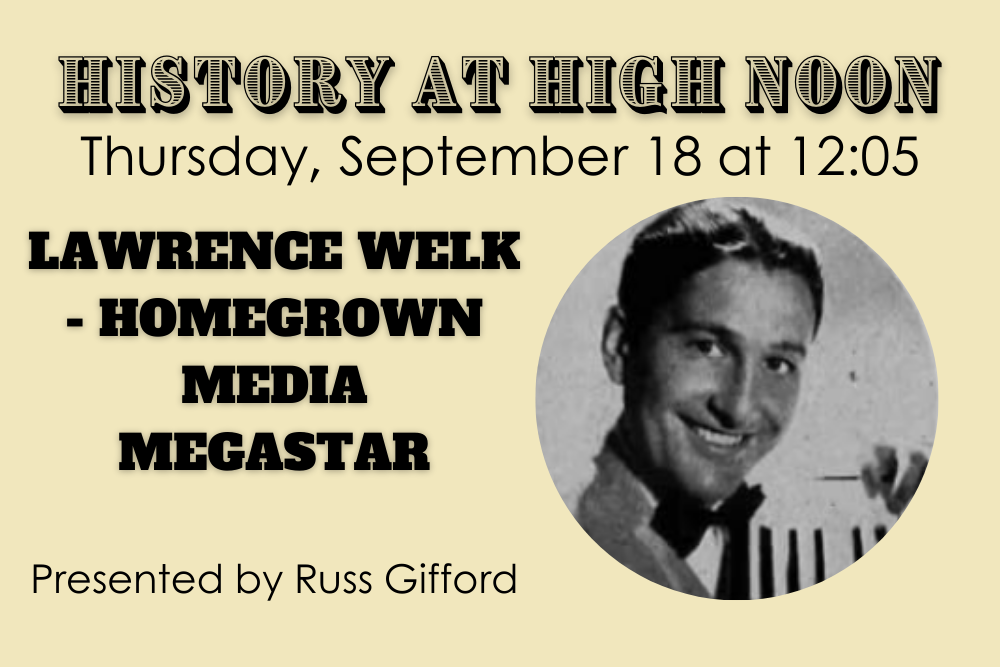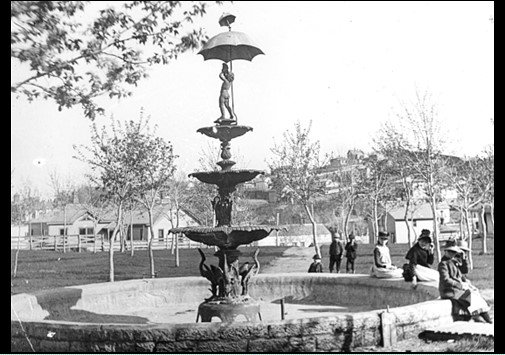
History at High Noon
Monthly History at High Noon presentations featuring historic photographs on a variety of topics of local interest.
Sioux City Public Museum / What’s Happening / History at High Noon
Coming Up
Attendees are invited to bring their own lunches to this free presentation.
Programs start at 12:05 p.m. and last approximately 45 minutes.
Most presentations are available online approximately three weeks after the program.
Join us for History at High Noon: The Real History of Thanksgiving, presented by Bruce Forbes, on November 20, beginning at 12:05 p.m.
Online Presentations
Missed a History at High Noon? Want to learn more about Sioux City history? View our previous presentations on our YouTube Channel.
Join us on Thursday, October 16 at 12:05 p.m. for History at High Noon: Sioux City Brews. This event is free to attend!
Join Russ Gifford and learn how Welk, while other bandleaders came and went, remained master of his future and ruled his region – and his timeslot – from the 1950s to the 1980s!
Join Russ Gifford as he explores Sioux City’s forgotten labor beginnings, the confrontations, and the sometimes-surprising differences that gave Sioux City a unique result.
Join us on Thursday, July 17 at 12:05 p.m. for History at High Noon: Jazz in Sioux City. This event is free to attend!
Spend your lunch hour at the Museum! Jerome Kills Small brings his personal experience as an Oglala Lakota to a discussion on what the spirit and science say about water.
Presented by local dinosaur hunters Brian Buckmeier and Darren Maurer, the minds behind the Dinosaurs of the Hell Creek exhibit.
Discover how the “girls” and Madam Shaw’s businesses were treated by the young city and its citizens, as Sioux City grappled with women’s rights, prostitution and the dangerous complexities that existed in frontier towns, presented by Russ Gifford, local historian.
Learn how one of Sioux City’s most well-known women’s clubs originated and became tied to Bruguier’s Cabin, one of the earliest structures built in what became Sioux City, presented by Grace Linden, former Sioux City Public Museum curator of history.
Learn how one of Sioux City’s most well-known women’s clubs originated and became tied to Bruguier’s Cabin, one of the earliest structures built in what became Sioux City, presented by Grace Linden, former Sioux City Public Museum curator of history.
In this History at High Noon, come ring in the first month of 2025 with a look at many different “firsts” in Sioux City’s history, presented by Haley Aguirre.
Presenter Matt Anderson, curator of history, will give a general overview of Sioux City’s meat industry from 1868-2002.
Presenter Tom Munson will explore the history of the Smith Family, the neighborhood, its residents, and its unique architecture.
Presenter Sun Rose IronShell will discuss the Annual Memorial March to Honor our Children.
Presenters Dr. Stacey Alex and Dr. Wilfrido Suárez will share several Sioux City Public Museum artifacts documenting Latina/o presence in our area.
In this presentation, Archival Records Clerk Haley Aguirre will give an overview of Sioux City’s many iconic neighborhoods: where they are, who named them, and what these names mean.
Presenter Russ Gifford chronicles the life of one of Sioux City’s most colorful mayors who stood up against the Anti-Saloon League and the Ku Klux Klan.
How did this park get its name? Why is it here? What is that monument? Tom Munson, Archives Manager, will take the audience on a historic “tour” of Sioux City Parks.
Presenter Matt Anderson, Curator of History, will provide an overview of the WWII Pacific Campaign and accounts of the contributions made by local residents. The program is held in conjunction with the Sioux City Public Museum's exhibit, Sioux City and the Pacific War 1941-1945.
Presenter Matt Anderson, Curator of History, traces the history of Sioux City’s largest nature preserve and public recreation area. Covering more than 800 acres, the park is also a pristine fragment of the Loess Hills.
Presenter Theresa Weaver, Curator of Education, chronicles young women’s involvement in local sports in recognition of Women’s History Month. Learn how Title IX and social movements pushed Sioux City schools into girls’ sports and how the iconic “Iowa Girl’s Basketball” story played out locally.
Presenter Haley Aguirre, Archival Records Clerk, traces how Sioux City went from having just 12 phone numbers in 1880 to over 75,000 telephones in operation by the end of the 1970s. Artifacts from the Museum’s Telephone Pioneers collection will be on display. (Rescheduled from December)
Presenter Tom Munson, Archives Manager, showcases early Sioux City images of scenery, celebrations, and disasters taken by M.W. Starks. Specializing in portraiture, Starks opened a temporary studio in 1883 that evolved into a prominent local photography studio that is still in operation today.
Presenter Matt Anderson, Curator of History, takes a look back at how battlefield medical care met the challenges of increasingly lethal weapons of war. How these wartime medical advances benefited the civilian population is also explored.
Presenter Sun Rose Iron Shell gives an in-depth look at Great Plains testimonials created on antique ledger paper printed here in Sioux City by Perkins Brothers Printing Company. FREE.
Presenter Haley Aguirre, Archival Records Clerk, looks back at the remarkable structures that promoted Sioux City across the country from 1887 to 1891.
Presenter Matt Anderson, Curator of History, will take a look back at the changes over the decade that left Sioux City a very different place in 1970 than it had been in 1959.
Presenter John Liepa explores the myths of baseball’s origins, the early history and evolution of the game, baseball’s journey to Iowa and the role of the Civil War in spreading its popularity. FREE.
Presenter Russ Gifford will trace Sioux City’s rail connections and their part in the industrial development that drove the city to lead the state in industry and commerce for decades.
Clay beds in the Sioux City area have been used for the making of brick, tile, and pottery since the 1850s. Brickyards dotted the landscape from Riverside to the Floyd River valley and from Leeds to Sergeant Bluff. Presented by Tom Munson, Archives Manager, in conjunction with Historic Preservation Week.
Presented by Matt Anderson, Curator of History, in conjunction with the exhibit, “Leeds High School 1939-1972” on display at the Sioux City Public Museum.






























